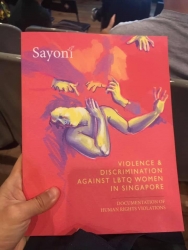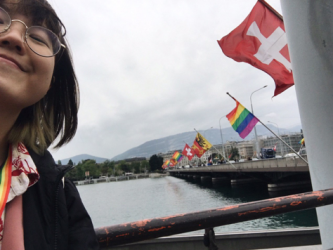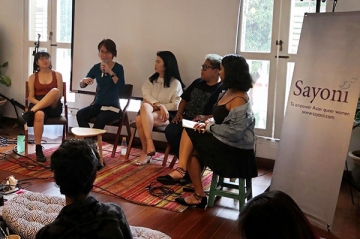The statement condemned killings, torture, arbitrary arrest, and “deprivation of economic, social and cultural rights, including the right to health.” The participating countries urged all nations to “promote and protect human rights of all persons, regardless of sexual orientation and gender identity,” and to end all criminal penalties against people because of their sexual orientation or gender identity.
According to calculations by ILGA (the International Lesbian, Gay, Bisexual, Transgender and Intersex Association) and other organizations, more than six dozen countries still have laws against consensual sex between adults of the same sex. The majority of these laws were left behind by colonial rulers (http://www.hrw.org/en/reports/2008/12/17/alien-legacy-0 ). The UN Human Rights Committee, which interprets the International Covenant on Civil and Political Rights (ICCPR), a core UN treaty, held in a historic 1994 decision that such laws are rights violations – and that human rights law forbids discrimination based on sexual orientation.
Human rights violations based on sexual orientation and gender identity happen regularly around the world. For example:
- In the United States, Amnesty International has documented serious patterns of police abuse against lesbian, gay, bisexual, and transgender people, including incidents amounting to torture and ill-treatment. The United States refused to sign the General Assembly statement.
- In Egypt, Human Rights Watch documented a massive crackdown on men suspected of homosexual conduct between 2001-2004, in which hundreds or thousands of men were arrested and tortured. Egypt actively opposed the General Assembly statement.
- The International Gay and Lesbian Human Rights Commission (IGLHRC) has documented how, in many African countries, sodomy laws and prejudice deny rights protections to Africans engaged in same-sex practices amid the HIV/AIDS pandemic – and can actually criminalize outreach to affected groups.
The signatories overcame intense opposition from a group of governments that regularly try to block UN attention to violations based on sexual orientation and gender identity. Only 57 states signed an alternative text promoted by the Organization of the Islamic Conference. While affirming the “principles of non-discrimination and equality,” they claimed that universal human rights did not include “the attempt to focus on the rights of certain persons.”
At first, the Holy See had voiced strong opposition to the General Assembly statement. Its opposition sparked severe criticism by human rights defenders worldwide. In a significant reversal, however, the Holy See indicated to the General Assembly today that it called for repeal of criminal penalties for homosexual conduct.
This year is the 60th anniversary of the Universal Declaration of Human Rights (UDHR), and the General Assembly statement reaffirms the reach and breadth of UDHR principles. The statement is non-binding, but restates what UN human rights bodies have repeatedly said: that no one should face rights violations because of their sexual orientation and gender identity.
Navanetham Pillay, the UN high commissioner for human rights, strongly supported the statement. In a videotaped message, she cited South Africa’s 1996 decision to protect sexual orientation in its Constitution. She pointed to the “task and challenge to move beyond a debate on whether all human beings have rights,” to “secure the climate for implementation.”
Since the Human Rights Committee’s landmark decision in 1994, United Nations experts have repeatedly acted against abuses that target lesbian, gay, bisexual, and transgender people, including killings, torture, rape, violence, disappearances, and discrimination in many areas of life. UN treaty bodies have called on states to end discrimination in law and policy.
Other international bodies have also opposed violence and discrimination based on sexual orientation and gender identity, including the Council of Europe and the European Union. In 2008, all 34 member countries of the Organization of American States unanimously approved a declaration affirming that human rights protections extend to sexual orientation and gender identity.
Earlier in the day, the General Assembly also adopted a resolution condemning extrajudicial executions, which contained a reference opposing killings based on sexual orientation. Uganda moved to delete that reference, but the General Assembly rejected this by 78-60.
The signatories to the General Assembly statement are:
Albania, Andorra, Argentina, Armenia, Australia, Austria, Belgium, Bolivia, Bosnia and Herzegovina, Brazil, Bulgaria, Canada, Cape Verde, Central African Republic, Chile, Colombia, Croatia, Cuba, Cyprus, Czech Republic, Denmark, Ecuador, Estonia, Finland, France, Gabon, Georgia, Germany, Greece, Guinea-Bissau, Hungary, Iceland, Ireland, Israel, Italy, Japan, Latvia, Liechtenstein, Lithuania, Luxembourg, Malta, Mauritius, Mexico, Montenegro, Nepal, Netherlands, New Zealand, Nicaragua, Norway, Paraguay, Poland, Portugal, Romania, San Marino, Sao Tome and Principe, Serbia, Slovakia, Slovenia, Spain, Sweden, Switzerland, the former Yugoslav Republic of Macedonia, Timor-Leste, United Kingdom, Uruguay, and Venezuela.
The Full Text of the French Statement and the Webcast of the UN Session
The French, who initiated the statement, have created a website (http://www.droitslgbt2008.fr/) about it with an attached document (PDF format, which can be downloaded from http://www.droitslgbt2008.fr/documents/?mode=download&id=2) that contains the statement in French (pages 1-2), Spanish (pages (3-4) and English (pages 5-6).
The entire day’s proceedings at the United Nations-the General Assembly Session, a subsequent panel discussion on “human rights, sexual orientation and gender identity,” and a press conference – were recorded and may be watched via the United Nations’ webcasting archive. Please note: the General Assembly Session lasted for 2 hours and 45 minutes but the statement condemning human rights abuses against LGBT people was read in the last 15-20 minutes. The following links are to the video files on UN website. You need to have Real Player on your computer in order to view the webcast:
- General Assembly: 70th and 71st plenary meeting, Morning session. http://webcast.un.org/ramgen/ondemand/ga/63/2008/ga081218am.rm. Duration: 2 hours and 45 minutes
- High-level panel discussion on “Human rights, sexual orientation and gender identity”(organized by the Permanent Missions of Argentina, Brazil, Croatia, France, Gabon, the Netherlands and Norway).http://webcast.un.org/ramgen/ondemand/specialevents/2008/se081218pm1.rm. Duration: 1 hour and 23 minutes.
- Informal comments to the Media by the Minister for Foreign Affairs of the Netherlands, H.E. Mr. Maxime Vergahen and the Secretary of State for International Affairs and Human Rights of France, H.E. Ms. Rama Yade. Duration: 16 minutes. http://webcast.un.org/ramgen/ondemand/stakeout/2008/so081218pm.rm
You can also read coverage of yesterday’s events by the Associated Press, including a comment by IGLHRC’s Executive Director, Paula Ettelbrick, here: http://www.google.com/hostednews/ap/article/ALeqM5h1rNjQnbi3UUwYn7JGfk4pLIO6DgD955IQK80.



